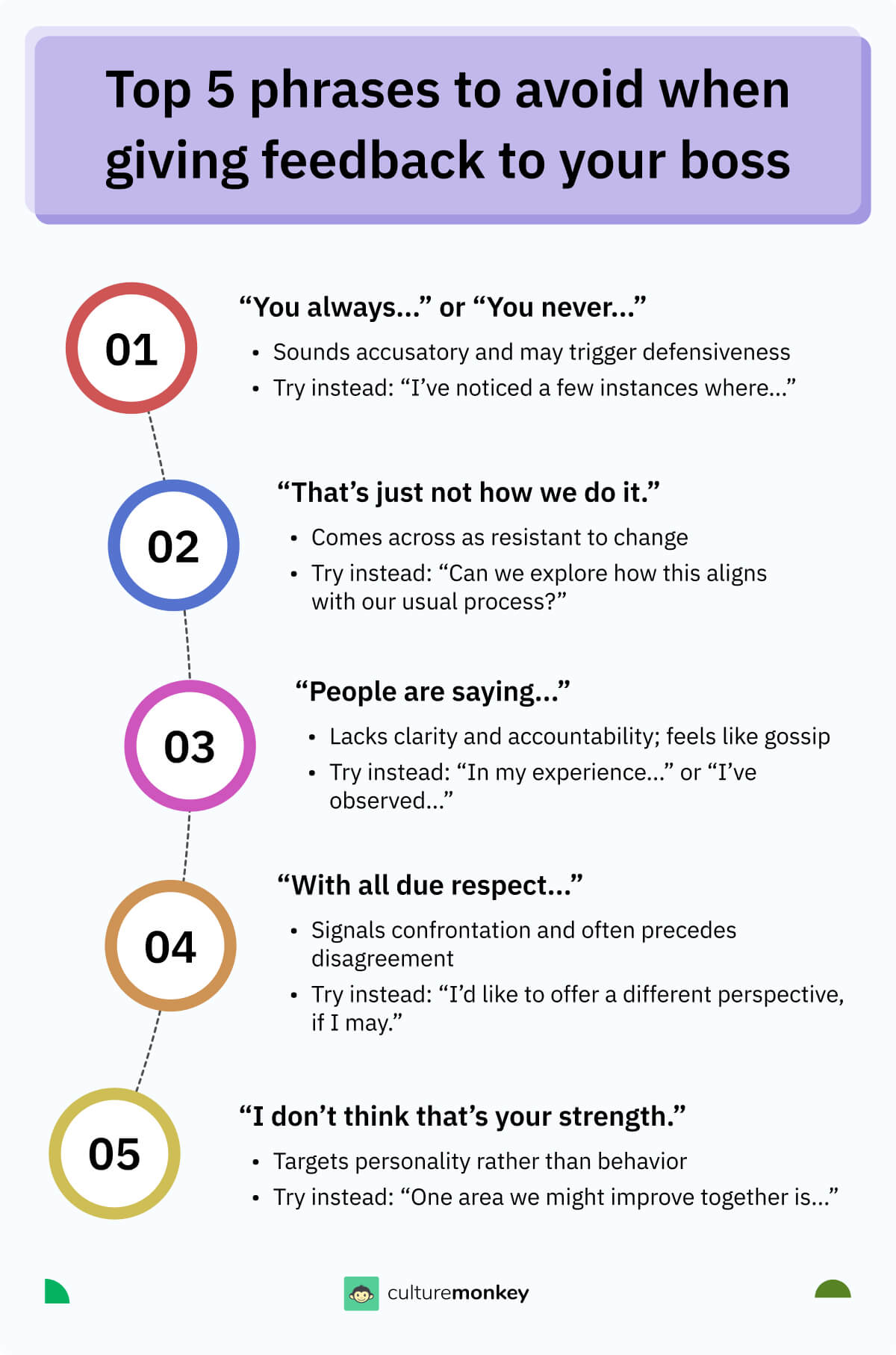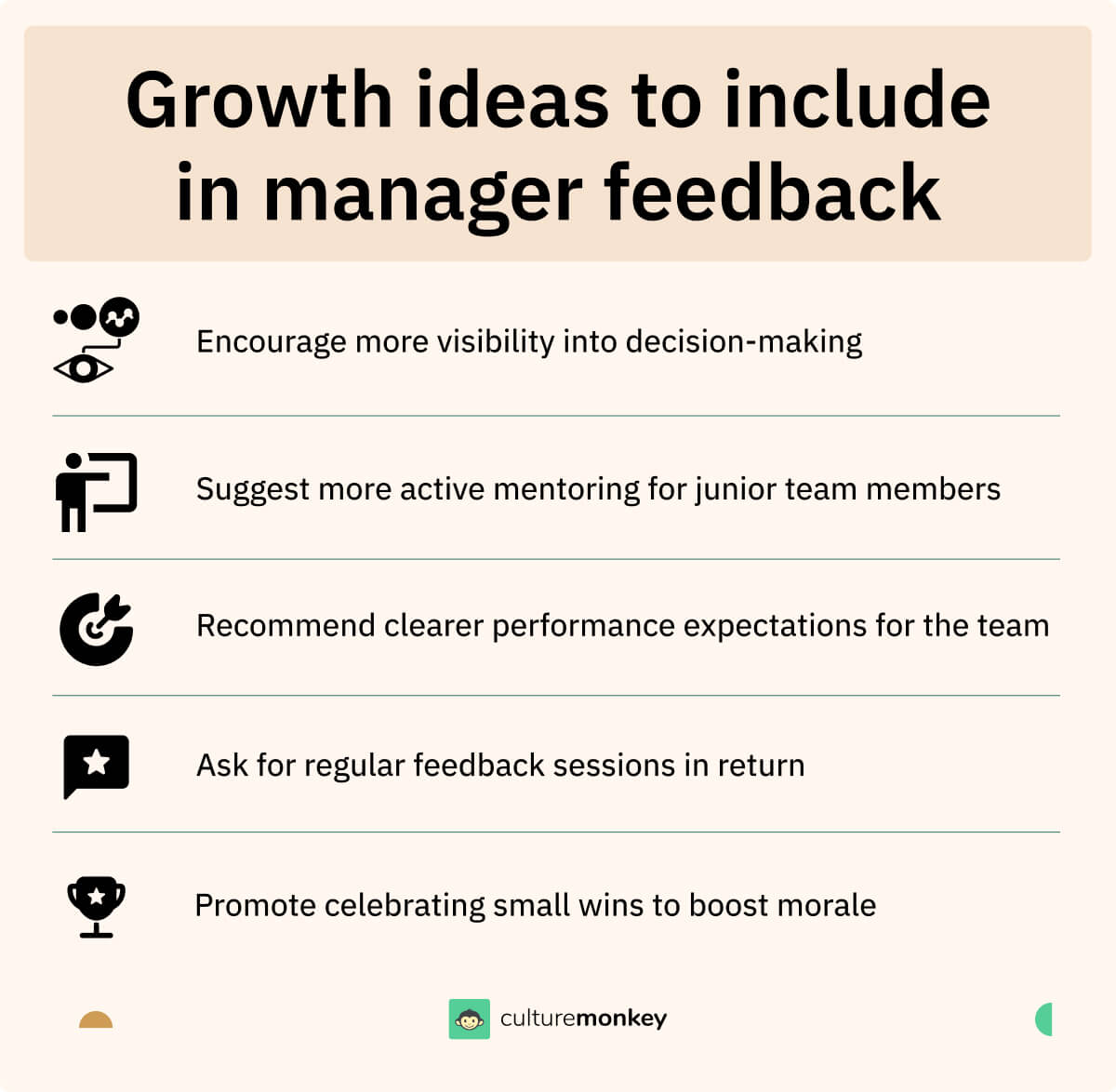125+ Feedback for manager examples and best practices that you should know

You’re assembling a piece of furniture. You follow the manual (kind of), tighten a few screws, and step back—only to realize it’s wobbly, uneven, and definitely not what you expected. The problem? You didn’t stop to check if you were doing it right along the way.
Managing a team works the same way. Without ongoing feedback, managers might assume everything is fine—until they notice disengaged employees, misaligned goals, or a drop in productivity. Feedback acts as a real-time quality check, helping managers course-correct before small issues turn into major structural problems.
But effective feedback isn’t just about pointing out what’s wrong—it’s about building something stronger, piece by piece. In this blog, we’ll break down 125+ feedback examples and best practices to help managers improve, employees feel heard, and teams function seamlessly—no missing screws required.
Blog Highlights


What is feedback for managers?

Feedback for managers is the process of offering constructive input and evaluations to leaders, supporting their professional development. This includes feedback for the boss, feedback to give your manager, and feedback sample for the manager. Effective manager feedback, including sample feedback for your manager, helps identify strengths and areas for growth while aligning actions with organizational goals.
Effective feedback empowers managers to enhance leadership skills, foster better communication, and align more closely with team and company objectives. Drawing from peers, superiors, and team members, feedback clarifies how a manager’s behavior impacts team dynamics and decision-making.
Over time, thoughtful feedback cultivates trust, accountability, and adaptability—qualities essential for navigating evolving workplace demands. Regular, balanced feedback encourages continuous learning and self-awareness in leadership roles. It also promotes a culture where openness and improvement are valued at every level of the organization.



We all need people who will give us feedback. That’s how we improve.
Founder
Microsoft
Importance of giving feedback for managers

The importance of giving feedback for managers cannot be overstated. It serves several crucial purposes:
- Improvement: Feedback provides managers with insights into their performance, helping them identify areas where they excel and those that need development. It's a catalyst for growth and improvement.
- Enhanced leadership: Constructive feedback helps managers become more effective leaders. It allows them to adapt their management style, communicate better, and make informed decisions.
- Motivation: Positive feedback boosts morale and motivation, while constructive feedback, when delivered properly, can act as a catalyst for change and inspire managers to reach their potential.
- Accountability: Feedback holds managers accountable for their actions and decisions, promoting responsibility and a culture of transparency.
- Team performance: Effective managers are instrumental in team success. Feedback equips them with the tools to lead teams to higher performance levels, resulting in increased productivity and job satisfaction.
- Organizational alignment: Feedback helps managers align their goals and strategies with those of the organization, ensuring everyone is working towards the same objectives.
- Conflict resolution: Managers often deal with conflicts within their teams. Feedback provides insights into these conflicts and offers guidance on how to address and make sure the team is on the same page.
- Employee development: Managers play a vital role in employee development. Feedback enables them to mentor and guide their team members effectively.
- Retention: Managers who provide regular feedback create a more positive work environment, which can enhance employee retention and reduce turnover.
- Innovation: By offering honest feedback and actively listening to employees, managers can encourage a culture of innovation within their teams.
- Skill enhancement: Feedback also allows managers to refine their own skills, such as problem-solving and decision-making, by learning from past experiences and applying those lessons to future challenges.
- Building trust: Consistent and honest feedback helps in building trust between managers and their teams, fostering a supportive and collaborative work environment where open communication is encouraged.
Feedback for managers is instrumental in their growth, leadership development, team performance, and overall organizational success. It is a two-way street where managers both receive and provide feedback, fostering a culture of continuous improvement and open communication.
When to give feedback to your manager?

Giving feedback to your manager is an important aspect of fostering open communication and continuous improvement. Here are some key situations when you should provide feedback to your manager:
- Scheduled one-on-one meetings: Use regular one-on-one meetings as a designated time to discuss your thoughts and concerns. This ensures that you have your manager's full attention and creates a safe space for feedback.
- After significant achievements: When you or your team achieve a significant milestone or success, it's a great time to offer positive feedback to acknowledge your manager's leadership and support.
- In response to their request: If your manager explicitly asks for feedback, this is an ideal opportunity to share your thoughts honestly and constructively.
- When there's a problem: If you encounter issues or challenges related to your work, department, or team that you believe your manager should be aware of, it's essential to provide feedback promptly. This allows your manager to address and resolve problems efficiently.
- After completing projects: At the end of a project or task, it's valuable to reflect on the experience and share feedback on what worked well and what could be improved for future projects.
- For personal growth and development: If you believe that offering feedback can help your manager's personal and professional development, share it in a supportive and constructive manner.
- When there's consistency in behavior: If you notice recurring patterns of behavior, whether positive or negative, it's beneficial to communicate this to your manager. Consistent feedback can help them reinforce positive behaviors or address recurring issues.
- Amid positive or negative change: During times of organizational change, such as restructuring, expansion, or downsizing, feedback can provide valuable insights into how these changes are affecting the team and what can be done to navigate them effectively.
- To express gratitude: Don't hesitate to express your appreciation and gratitude to your manager when they have been supportive, and understanding, or when you've experienced positive leadership.
- With diplomacy and sensitivity: Always choose an appropriate time and place to give feedback. Be diplomatic, and empathetic, and use "I" statements to express your thoughts without sounding accusatory.
- During performance reviews: Performance reviews offer a structured opportunity for managers to receive feedback. Use this time to discuss how their leadership has impacted team performance and explore ways to enhance collaboration and effectiveness.
- When seeking clarification: If there’s confusion or a lack of clarity on expectations, feedback can help managers identify where communication may have faltered, leading to improved guidance and support for their teams.
In all these situations, the key is to provide feedback constructively, focusing on the issue at hand rather than making it personal. Effective feedback helps foster a culture of continuous improvement and strengthens the working relationship between employees and their managers.
Positive feedback vs negative feedback to managers
| Aspect | Positive feedback | Negative feedback |
|---|---|---|
| Purpose | Reinforces strengths and boosts morale – often used in manager comments on performance review. | Identifies areas for improvement using constructive feedback for manager. |
| Tone and delivery | Upbeat, appreciative, and specific – fosters trust and engagement. | Respectful, calm, and solution-focused – mirrors manager performance evaluation examples. |
| Impact on engagement | Increases motivation and connection to team goals through timely employee feedback. | Can enhance clarity and performance when aligned with clear expectations. |
| Usage frequency | Should be given regularly to recognize positive actions and achievements. | Used thoughtfully to address patterns or behaviors that need correction. |
| Actionability | Encourages repetition of successful behaviors seen in manager performance review examples. | Should include clear suggestions to guide future improvement. |
| Balanced reviews | Complements critiques to create well-rounded manager reviews. | Provides the critical insight needed for professional growth and accountability. |
How to send feedback to managers in the first place?

Sending feedback to your manager for the first time can be intimidating, but it's a crucial skill. Here are a few creative steps to help you provide feedback effectively:
- Choose the right moment – Find an appropriate time when your manager is available and do not rush. It's essential to create a comfortable atmosphere for this conversation.
- Frame your feedback positively – Start with a positive note. Express your appreciation for their leadership and mention what you admire about their management style. This sets the stage for constructive feedback.
- Be specific and provide examples – Rather than making vague statements, use specific examples to illustrate your points. If you're discussing an issue, describe the situation, your observations, and the impact it had.
- Offer solutions – Don't just point out problems; suggest potential solutions. This shows that you're not only identifying issues but also willing to collaborate to find ways to address them.
- Focus on "I" statements – Use "I" statements to convey your feedback. For instance, say, "I noticed that," or "I felt that." This approach shifts the conversation from blaming to sharing your perspective.
Remember that the goal of giving feedback is to help both you and your manager improve and foster a more productive working relationship. Be open to receiving feedback in return and maintain a constructive and respectful tone throughout the conversation.
Types of feedback for manager

Feedback for managers plays a crucial role in personal and professional development. It helps them understand their strengths and weaknesses, fine-tune their management style, and lead more effectively.
There are several types of feedback for managers, each serving a unique purpose in fostering growth and improvement. Here are the key types of feedback they can receive:
- Performance feedback: Performance feedback focuses on a manager's daily responsibilities and their ability to meet goals and targets. This type of feedback assesses how well they are executing their role, making decisions, and handling tasks. Performance feedback may include discussions on their time management, delegation, and work quality.
- Behavioral feedback: Behavioral feedback addresses a manager's interpersonal skills, communication style, and interactions with their team. It often involves aspects like empathy, active listening, conflict resolution, and how well they motivate and inspire their team. Behavioral feedback is valuable for improving team dynamics and creating a positive work environment.
- Developmental feedback: Developmental feedback aims to help managers enhance their skills and knowledge to meet future challenges. It focuses on their career growth and skill development. Managers receiving developmental feedback can explore opportunities for training, workshops, or mentorship to expand their expertise and readiness for new roles.
- 360-degree feedback: 360-degree feedback gathers input from various sources, including peers, subordinates, and superiors. This well-rounded approach provides a comprehensive view of a manager's performance, as it incorporates multiple perspectives. It can reveal insights into a manager's effectiveness from different angles and help identify strengths and areas for improvement.
- Crisis or corrective feedback: Crisis or corrective feedback is essential when a manager's actions or decisions have negatively impacted the team or the organization. It should address the immediate issue at hand and propose corrective actions to mitigate future damage. It can be challenging to deliver but is crucial for accountability and learning from mistakes.
- Motivational feedback: Motivational feedback aims to inspire and uplift managers. It acknowledges their accomplishments, expresses gratitude for their dedication, and motivates them to continue performing at a high level. It helps boost morale, increase engagement, and maintain a positive work atmosphere.
- Goal-oriented feedback: Goal-oriented feedback centers around a manager's progress toward their goals and objectives. It measures how effectively they are steering their team towards achieving these targets. This type of feedback is particularly helpful in ensuring alignment with the organization's strategic objectives.
- Constructive feedback: Constructive feedback is crucial for identifying areas of improvement while maintaining a positive and encouraging tone. It should focus on specific behaviors or actions that need adjustment and provide actionable recommendations. The goal is to help the manager grow without demoralizing them.
- Positive feedback: Positive feedback recognizes and appreciates a manager's achievements, strong leadership, and contributions to the organization. It fosters a sense of accomplishment, motivates the manager to excel further, and strengthens their commitment to the team and company.
- Coaching feedback: Coaching feedback is a form of ongoing support that helps managers enhance their skills and reach their potential. It involves regular one-on-one sessions with a coach or mentor who provides guidance, advice, and developmental suggestions. Coaching feedback can be tailored to the manager's unique needs and aspirations.
- Culture feedback: Culture feedback assesses how well a manager aligns with the organization's culture, values, and mission. It helps in maintaining a consistent culture across the organization and can involve discussions on integrity, ethics, and inclusivity.
- Employee feedback: Feedback from team members can be invaluable for managers. It provides insights into how they are perceived by their subordinates and helps them adjust their approach based on the team's needs and preferences. Employee feedback i.e. upward feedback may also include insights into work-life balance, workload, and support required from the manager.
- Customer feedback: In roles where managers have direct interactions with customers, feedback from clients can be a valuable source of insights. This type of feedback can provide managers with a customer-centric perspective, helping them improve relationships and customer satisfaction.
Feedback for managers is a multifaceted tool that helps them grow, excel in their roles, and positively influence their teams and organizations. Each type of feedback serves a unique purpose, and a combination of these feedback types can create a well-rounded approach to personal and professional development.
Effective feedback is a cornerstone of leadership development, enabling managers to adapt, learn, and continuously improve their skills.
125+ Positive, negative, and constructive feedback examples for managers to give in the workplace

Feedback is a crucial element of effective management. Managers must provide feedback that encourages growth and development while also addressing issues constructively.
Here are 125+ examples of positive, negative, and constructive feedback that managers can give in the workplace:
Positive feedback to manager examples:
- Positive performance acknowledgment: "I appreciate your outstanding performance on the project. Your dedication and attention to detail have greatly contributed to our success."
- Team appreciation: "Your teamwork skills are impressive. You consistently support your colleagues and contribute to a positive team environment."
- Leadership recognition: "Your leadership in the recent client presentation was outstanding. You maintained control and guided the team with confidence."
- Innovative contributions: "Your innovative ideas for process improvement have significantly enhanced our workflow. Keep up the creativity."
- Adaptability praise: "Your ability to adapt to changing circumstances and manage stress is commendable. It sets a great example for the team."
- Problem-solving skills: "Your approach to problem-solving is excellent. You've shown an exceptional ability to resolve complex issues efficiently."
- Customer satisfaction: "Our customers often praise your excellent service. Your commitment to customer satisfaction is exemplary."
- Meeting deadlines: "Your consistent ability to meet tight deadlines is remarkable. It's a valuable asset to our team."
- Quality assurance: "Your attention to quality assurance ensures our products meet the highest standards. Your dedication is appreciated."
- Communication skills: "Your communication skills are exceptional. You explain complex ideas clearly, which helps our team work more cohesively."
- Initiative and proactiveness: "I noticed your initiative in identifying areas for improvement. Your proactive approach is admirable."
- Creativity in problem-solving: "Your creative problem-solving techniques bring fresh perspectives to our team's challenges, leading to innovative solutions."
- Team leadership in crisis management: "Your leadership during times of crisis inspires confidence and fosters resilience within the team."
- Client relationship management: "Your ability to build strong relationships with clients fosters trust and loyalty, enhancing our reputation and business growth."
- Consistency in performance: "Your consistent high performance sets a benchmark for excellence within our team, driving us towards our goals."
- Feedback responsiveness: "Your prompt and constructive response to feedback demonstrates your commitment to personal and team growth."
- Collaboration and cross-functional teamwork: "Your willingness to collaborate across departments and share knowledge enhances our collective effectiveness and success."
- Initiative in professional development: "Your proactive approach to seeking out learning opportunities and skill development sets a positive example for the team."
- Inspirational leadership: "Your ability to inspire and motivate team members to achieve their best brings out the best in all of us, driving our collective success."
- Attention to detail in project management: "Your meticulous attention to detail ensures that no aspect of our projects is overlooked, contributing to their successful completion."
- Problem anticipation and prevention: "Your foresight in anticipating potential problems and taking proactive measures to prevent them saves time and resources, ensuring smooth project execution."
- Strategic thinking: "Your strategic approach to planning has greatly contributed to the long-term success of our projects. Your ability to think ahead is a significant asset."
- Resourcefulness: "Your resourcefulness in overcoming obstacles is impressive. You consistently find ways to get the job done efficiently, even when faced with challenges."
- Mentorship: "Your mentorship and guidance have had a positive impact on the team's development. Your willingness to share knowledge and support others is invaluable."
- Recognition of commitment: "Your dedication to staying late and ensuring the project was completed on time did not go unnoticed. Your hard work sets an example for the entire team."
- Encouragement for risk-taking: "Your willingness to take calculated risks has led to some remarkable outcomes. Your bold approach inspires innovation in the team."
- Responsiveness to challenges: "Your quick response during the system outage minimized downtime. Your efficiency and resourcefulness made a significant difference."
- Celebrating initiative in process automation: "Your efforts to automate repetitive tasks have saved the team a lot of time. Your forward-thinking mindset is commendable."
- Focus on sustainability: "Your suggestion to adopt sustainable practices in operations is thoughtful and aligns with our company values. It’s great to see your initiative in making a difference."
- Creating learning opportunities: "Your efforts to organize knowledge-sharing sessions have enhanced the team's skills and confidence."
- Encouragement of diversity: "Your inclusive approach to team-building strengthens collaboration and enriches our workplace culture."
- Persistence during challenges: "Your perseverance during difficult phases of the project demonstrated remarkable leadership."
- Focus on customer loyalty: "Your initiatives in building long-term relationships with clients have significantly increased loyalty and trust."
- Acknowledgment of ethical standards: "Your commitment to maintaining high ethical standards sets a benchmark for the team to follow."
- Upholding transparency: "Your transparent communication builds trust and ensures everyone is aligned with the goals."
- Team spirit in celebrations: "Your enthusiasm in organizing team celebrations brings everyone closer and strengthens bonds."
- Recognition for quick learning: "Your ability to quickly learn and adapt to new tools has been impressive and helpful to the team."
- Contribution to company culture: "Your consistent efforts in promoting our company values enrich the workplace culture."
- Support during transitions: "Your support and guidance during organizational transitions have been a stabilizing force for the team."
- Encouraging inclusion: "Your openness to suggestions during our brainstorming sessions encouraged everyone to contribute more confidently."
- Boosting team morale: "You consistently uplift team spirit with your optimistic attitude, especially during tight deadlines."
- Empowering leadership: "Your ability to empower each team member helps us work independently and with confidence."
- Promoting work-life balance: "Your support for work-life balance has helped improve team morale and productivity."
- Celebrating small wins: "The way you celebrate even small wins keeps the team motivated and aligned."
- Reinforcing growth mindset: "Your positive reinforcement encourages us to stretch beyond our comfort zones."
- Leading by example: "Your willingness to roll up your sleeves and help shows that leadership is about action."
- Effective mentorship: "Thanks to your mentorship, I’ve grown in confidence and responsibility in my role."
Negative feedback to your manager examples:
- Constructive critique: "While your ideas are strong, sometimes they can come across as dominating discussions. Try to involve others more."
- Incomplete work addressed: "I've noticed that some of your recent reports have had incomplete sections. Let's ensure all aspects are covered."
- Tardiness concern: "Lately, you've been arriving late for meetings. Punctuality is essential, and I'd like to see improvement in this area."
- Feedback about micromanagement: "I've received feedback from the team about micromanagement. Trust your team more to handle their tasks."
- Team collaboration feedback: "You have the knowledge; now let's work on your teamwork skills. Collaborating more effectively is key."
- Communication improvement: "Your emails sometimes lack clarity, leading to misunderstandings. Take more time to compose effective messages."
- Expectation clarification: "It's crucial to have clearly defined expectations. Let's work on setting more specific goals for your projects."
- Handling stress feedback: "Managing stress is challenging, but it's vital to avoid outbursts at work. Consider stress management techniques."
- Conflict resolution discussion: "Handling conflicts constructively is essential. Avoiding confrontations and working on conflict resolution is key."
- Time management concern: "I've noticed that your time management could be more efficient. Prioritize tasks and minimize distractions."
- Feedback on attention to detail: "I've observed some oversights in your work that could have been avoided with closer attention to detail. Let's focus on improving your accuracy and thoroughness."
- Feedback about meeting participation: "Your presence and input in team meetings are valuable, but I've noticed you've been relatively quiet lately. Let's work on actively engaging and contributing to discussions."
- Feedback on decision-making: "Your decision-making process seems to be hesitant at times, leading to delays in project progress. Let's explore strategies to improve your confidence and decisiveness."
- Feedback on delegation: "While it's important to be hands-on, delegating tasks to team members can help distribute workload and foster their development. Let's discuss how you can delegate more effectively."
- Feedback about responsiveness: "There have been instances where your response time to emails or requests has been slow, causing delays in communication. Let's aim for more prompt and proactive responses."
- Feedback on attitude: "Your demeanor in certain situations has been perceived as negative by colleagues, affecting team morale. Let's work on maintaining a positive and constructive attitude in all interactions."
- Feedback about initiative: "I'd like to see more initiative from you in taking on new challenges or proposing innovative ideas. Let's discuss ways to encourage and support your proactive approach."
- Feedback on professional development: "Investing in your professional development is important for career growth. Let's explore opportunities for training or skill enhancement to further your development."
- Feedback on collaboration with other departments: "Your interactions with other departments seem limited. Let's work on building better relationships and collaborating more effectively with colleagues from different teams."
- Feedback on adaptability to change: "Adapting to changes in processes or priorities is essential in a dynamic work environment. Let's focus on improving your flexibility and resilience in the face of change."
- Feedback about self-reflection and improvement: "Reflecting on your performance and actively seeking ways to improve is key to personal and professional growth. Let's work on developing a mindset of continuous improvement."
- Feedback on prioritization: "I've noticed that some tasks are being prioritized over more critical ones. Let's work on refining your ability to prioritize tasks based on urgency and importance."
- Feedback on adaptability to feedback: "There have been instances where you've been resistant to feedback. Embracing feedback is essential for growth; let's work on being more open to constructive criticism."
- Feedback on multitasking: "While multitasking can be effective, it seems to be impacting the quality of your work. Let's focus on managing tasks more effectively, one at a time."
- Feedback on task follow-through: "There have been instances where tasks assigned to you were left incomplete. Let's work on ensuring proper follow-through on responsibilities."
- Addressing clarity in instructions: "Your instructions sometimes leave team members confused. Let's focus on giving more detailed and precise directions."
- Feedback on balancing workload: "It seems you're taking on too many tasks, affecting the quality of your output. Let’s prioritize workload management."
- Addressing interpersonal conflicts: "There have been some tensions with colleagues. Let's work on improving communication and fostering better relationships."
- Improvement in goal alignment: "Some of your recent initiatives haven’t aligned with team objectives. Let’s focus on aligning personal goals with organizational priorities."
- Feedback on respecting deadlines: "I’ve noticed delays in your deliverables recently. Meeting deadlines is critical for the team’s success."
- Guidance on public speaking: "Your presentations are informative but could use more confidence and clarity. Let’s work on improving your public speaking skills."
- Feedback on tone during feedback: "Your tone during discussions comes off as overly critical at times. Let’s aim for more constructive and supportive communication."
- Focus on accountability: "It’s important to take responsibility when things don’t go as planned. Let’s work on building a stronger sense of accountability."
- Feedback on meeting preparation: "Your lack of preparation for recent meetings has impacted productivity. Let’s ensure you’re better equipped moving forward."
- Addressing multitasking inefficiency: "Your multitasking often results in incomplete tasks. Let’s focus on managing one priority at a time."
- Feedback on respecting team opinions: "You’ve dismissed team suggestions in recent discussions. Let’s work on being more receptive to diverse perspectives."
- Guidance on delegation clarity: "Your delegation lacks clear instructions, leaving team members unsure of expectations. Let’s refine this process."
- Addressing passive communication: "Your reluctance to voice concerns during meetings can hinder progress. Let’s work on being more proactive in sharing your input."
- Improvement in adaptability to feedback: "You’ve shown hesitation in applying feedback. Embracing suggestions constructively is key to personal growth."
- Balancing feedback tone: "Sometimes your feedback focuses too much on what went wrong—balancing it with what's working would help morale."
- Equitable task distribution: "You tend to rely on a few team members for everything—distributing tasks more evenly could build trust across the board."
- Improving transparency: "The team sometimes feels left out of strategic decisions—more transparency would foster alignment."
- Consistent team presence: "You occasionally skip team check-ins—these are vital to maintain connection and communication."
- Managing changing expectations: "When expectations shift mid-project, it causes confusion—more clarity upfront would help."
- Leadership visibility in recognition: "You’ve been missing from recent employee appreciation efforts—your presence makes a difference."
- Inclusive decision-making: "Sometimes decisions are made too quickly without team input—taking a pause for feedback could improve outcomes."
- Focused one-on-ones: "Your multitasking during 1:1s feels disengaged—dedicated attention would mean a lot to the team."
Constructive feedback for managers:
- Encourage proactive leadership: "Your leadership is valued, but taking more initiative in driving team goals could elevate overall performance. Let's explore ways to step up your proactive approach."
- Improve active listening: "Your insights are valuable, but ensuring active listening in team discussions will strengthen collaboration and foster a more open dialogue."
- Enhance conflict resolution skills: "Your ability to manage team challenges is commendable, but developing a structured approach to conflict resolution will make team interactions even smoother."
- Develop mentorship skills: "Your experience is a great asset to the team. Actively mentoring junior employees can enhance team knowledge-sharing and build stronger future leaders."
- Strengthen delegation practices: "Empowering team members with responsibilities fosters trust. Delegating more effectively will free up your time for strategic tasks while allowing others to develop."
- Increase focus on innovation: "Your execution skills are strong, but bringing more innovative problem-solving approaches will help the team stay ahead of challenges and improve efficiency."
- Foster a more inclusive work environment: "Your leadership can set the tone for inclusivity. Encouraging diverse perspectives in discussions will lead to richer, well-rounded decisions."
- Encourage risk-taking in a controlled manner: "Your careful approach is valued, but supporting calculated risks can lead to innovative breakthroughs. Let’s explore ways to embrace strategic experimentation."
- Improve feedback receptiveness: "Feedback is a tool for growth. Being more open to constructive input from peers and team members will help refine your leadership style."
- Develop stronger emotional intelligence: "Your leadership is strong, but being more attuned to team morale and emotions can further boost engagement and motivation."
- Refine communication clarity: "Your messages are impactful, but refining clarity and conciseness in written and verbal communication will ensure that expectations are always well understood."
- Drive goal alignment across teams: "Your vision is clear, but reinforcing goal alignment across departments will enhance collaboration and eliminate silos."
- Encourage autonomy within the team: "Your guidance is appreciated, but providing the team with more autonomy will enhance ownership, motivation, and overall efficiency."
- Improve adaptability to change: "Change is constant, and adapting more flexibly to new processes and challenges will inspire confidence and agility within the team."
- Strengthen decision-making confidence: "Your analytical approach is strong, but making more decisive calls in critical situations will instill greater confidence within the team."
- Provide more structured feedback: "Your feedback is insightful, but adding structure and consistency will help team members understand how to improve effectively."
- Encourage more cross-functional collaboration: "Your expertise is valuable, and engaging more with cross-functional teams will create opportunities for knowledge sharing and innovation."
- Focus on work-life balance for sustainability: "Your commitment is admirable, but maintaining a healthy balance will ensure long-term productivity and personal well-being."
- Improve responsiveness to team concerns: "Team members appreciate your guidance, but responding more promptly to their concerns will enhance trust and engagement."
- Strengthen accountability in leadership: "Owning successes and setbacks alike sets a strong example. Reinforcing accountability in leadership will inspire the same in your team."
- Encourage continuous learning: "Your industry knowledge is strong, but actively pursuing further learning opportunities will keep you ahead in a fast-evolving landscape."
- Build a culture of recognition: "Your leadership is valued, but recognizing and celebrating team achievements more frequently will enhance motivation and morale."
- Enhance your strategic planning approach: "Your problem-solving skills are excellent, but strengthening your long-term strategic planning will help the team work towards sustained success."
- Foster a feedback-driven environment: "Your leadership is impactful, but creating an open culture where feedback flows in all directions will further improve team performance."
- Refine personal development goals: "Setting specific personal leadership development goals will ensure that you continue growing alongside your team, fostering long-term success."
- Documenting knowledge: "Consider building a knowledge base or guide for recurring processes to reduce onboarding time and errors."
- Quarterly growth targets: "You’ve made great progress as a leader—setting quarterly leadership goals could continue that momentum."
- Cross-department mentorship: "Explore more cross-department mentorship to expand your influence and develop organizational insight."
- Fostering peer recognition: "Encouraging peer-to-peer recognition within the team could foster a stronger culture of appreciation."
- Time for innovation: "Try carving out regular time to brainstorm innovations—your insight often sparks great ideas."
- Weekly team retrospective: "Build a ritual of weekly reflection—what worked, what didn’t—to help the team and yourself iterate faster."
- Junior leadership opportunities: "Offer more opportunities for junior team members to lead initiatives—it builds skill and confidence."
- Visual communication: "Create visual roadmaps for projects—your clarity will scale better across hybrid teams."
- Open Q&A engagement: "Promote open Q&A sessions after town halls—it’ll reinforce your transparency and approachability."

Make every word count
to your manager
Share feedback with confidence because great leadership grows from clear, honest, and thoughtful conversations.
When to avoid giving feedback to your manager?

- During high-stress situations: If your manager is overwhelmed with deadlines or dealing with a critical issue, avoid adding feedback to the mix. Wait for a calmer moment to ensure your message is well-received.
- In public settings: Offering feedback in front of others can come across as disrespectful or confrontational. Always choose a private setting to maintain professionalism and mutual respect.
- Without clear examples: If your feedback is vague or lacks specific instances, it may seem unhelpful or unfounded. Take time to gather concrete examples before addressing your concerns.
- When emotions are running high: If you're upset or frustrated, your feedback might come across as impulsive or overly critical. Wait until you’ve calmed down to ensure your message is constructive.
- Immediately after a mistake: Managers, like everyone else, need time to process errors. Giving feedback too soon can feel like piling on. Allow space before sharing your perspective.
- If feedback isn't actionable: If your feedback doesn’t offer a clear solution or path forward, it may seem like mere criticism. Focus on providing constructive suggestions instead.
- When your intent isn’t positive: If your feedback is driven by personal grievances rather than professional concerns, it’s better to hold off. Ensure your intent is aligned with team improvement.
How can constructive feedback improve manager-employee relationships?
Constructive feedback to managers plays a pivotal role in refining managerial skills and enhancing workplace dynamics. When delivered effectively, this feedback can significantly improve manager-employee relationships by fostering clarity, growth, and mutual respect. Here’s how providing feedback to managers can enhance these relationships:
- Clarifying expectations: Providing clear, constructive feedback helps managers better understand their roles and the expectations placed upon them. This clarity enables them to set realistic and aligned goals for their teams, fostering a more cohesive and motivated work environment.
- Enhancing communication skills: Feedback often highlights areas where managers can improve their communication with their teams. By refining these skills, managers can convey expectations more effectively, listen actively, and respond to employee concerns, contributing to stronger, more trusting relationships.
- Encouraging emotional intelligence: Constructive feedback can guide managers in understanding and managing emotions, both their own and those of their employees. Improved emotional intelligence allows managers to navigate conflicts more effectively, respond empathetically, and create a supportive team atmosphere.
- Promoting consistency in leadership: Feedback helps managers maintain consistency in their leadership style. When they apply consistent principles in decision-making and interactions, it builds reliability and trust within the team, strengthening relationships over time.
- Driving professional development: Feedback can highlight opportunities for managers to develop new skills or improve existing ones. This focus on continuous learning not only enhances the manager’s capabilities but also demonstrates a commitment to growth, encouraging a reciprocal investment in nurturing employee relationships.
Common mistakes to avoid when giving feedback to a manager
Avoiding common mistakes ensures feedback is constructive, well-received, and leads to positive change. Here are the key mistakes to avoid when giving feedback to a manager:
- Being too vague or general – Providing unclear feedback like "You need to improve communication" lacks actionable insights. Instead, offer specific examples and describe the impact of their actions to help them understand and make meaningful changes.
- Delivering feedback at the wrong time or place – Giving feedback in a public setting or during a high-stress moment can make a manager defensive. Choose a private, calm environment where they can engage openly without external pressures.
- Focusing only on negatives – Highlighting only flaws can make feedback feel like criticism rather than an opportunity for growth. Balance constructive points with positive aspects of their leadership to encourage openness to improvement.
- Ignoring your own role in the situation – Feedback should be a two-way process. If issues arise due to miscommunication or unclear expectations, acknowledge your role in the dynamic rather than placing all responsibility on the manager.
- Making it personal rather than professional – Attacking character traits instead of work-related behavior can damage relationships. Stick to observable actions and their impact rather than making assumptions about intent or personality.
How can managers encourage a culture of continuous feedback?

- Lead by example: Managers should actively seek feedback from their team. Demonstrating openness sets a tone of trust and encourages employees to do the same.
- Normalize feedback in daily interactions: Instead of reserving feedback for formal manager review, weave it into casual conversations. This makes it a natural part of work culture.
- Promote psychological safety: Foster an environment where employees feel safe to share their thoughts without fear of judgment or retaliation.
- Use feedback to recognize strengths: Don’t only focus on areas of improvement. Highlighting strengths motivates employees to maintain and enhance their performance.
- Train employees on feedback skills: Many employees hesitate to give feedback because they lack the skills. Provide training on how to offer and receive constructive insights.
- Leverage technology: Use feedback tools or platforms to collect real-time insights, ensuring the process is consistent and anonymous when needed.
- Act on feedback promptly: When employees see their feedback implemented, it validates their input and reinforces a culture of sharing.
- Encourage peer-to-peer feedback: Feedback shouldn't only flow top-down or bottom-up. Peer feedback promotes collaboration and trust among team members.
- Celebrate feedback milestones: Acknowledge moments when feedback led to significant improvements, showcasing its value to the entire team.
- Build feedback into KPIs: Incorporate feedback-related goals into team performance indicators to emphasize its importance as a measurable and integral part of the workplace.
The role of HR in facilitating feedback loops for managers
- Implementing anonymous feedback mechanisms – HR ensures that employees can share candid feedback about their managers through confidential surveys, fostering honesty without fear of retaliation.
- Standardizing performance review processes – By establishing structured and consistent feedback cycles, HR helps feedback for manager questions and evaluations rather than relying solely on annual reviews.
- Training managers on feedback reception – HR conducts workshops and coaching sessions to help managers develop active listening skills, process feedback constructively, and implement necessary improvements.
- Encouraging 360-degree feedback – Facilitating multi-source feedback from peers, subordinates, and senior leaders allows HR to provide managers with a comprehensive view of their strengths and areas for improvement.
- Acting as a neutral mediator – When tensions arise between employees and managers over feedback, HR plays a crucial role in resolving issues, ensuring a fair and objective approach to communication.
- Providing action plans for development – HR translates feedback into targeted growth plans, offering training, mentorship, and resources to help managers bridge leadership gaps.
- Tracking progress and accountability – Regular follow-ups and data-driven insights allow HR to measure improvements in managerial performance and adjust strategies as needed.
How can leaders encourage employee feedback for managers?

Encouraging employee feedback for managers is vital for fostering a culture of transparency and continuous improvement. Leaders can take these five often-overlooked steps to effectively gather valuable insights:
- Model open communication: Leaders should lead by example, actively seeking feedback themselves. By demonstrating a willingness to listen and act on suggestions, they create a ripple effect, encouraging employees to feel safe sharing their thoughts about managers.
- Utilize anonymous channels: While one-on-one discussions are ideal, anonymity can empower employees who fear repercussions. Using tools like anonymous surveys or suggestion boxes ensures candid feedback without compromising employees' sense of security.
- Integrate feedback into regular processes: Make feedback collection part of routine processes like performance reviews or team meetings. Consistency normalizes feedback culture, showing employees it’s a valued and ongoing practice rather than a one-time activity.
- Train employees on constructive feedback: Employees often hesitate because they don’t know how to phrase concerns constructively. Providing training on how to deliver actionable and respectful feedback can break this barrier.
- Celebrate implemented Feedback: Publicly acknowledging and acting on employee feedback demonstrates its importance. Highlighting positive changes reinforces trust, motivating employees to share more insights in the future.
Tools and techniques for giving feedback
Providing effective feedback requires a structured approach and the right tools. Here are some tools and techniques that ensure feedback is clear, actionable, and impactful.
The SBI (Situation-Behavior-Impact) Model
The SBI model is a simple yet powerful framework for giving feedback. It focuses on three key components:
- Situation: Describe the specific context where the behavior occurred.
- Behavior: Highlight the exact actions or words observed, staying objective and factual.
- Impact: Explain the effect of the behavior on the team, project, or individual.
This approach removes ambiguity and ensures feedback remains constructive, fostering understanding and growth.
The GROW (Goal-Reality-Options-Will) Framework
The GROW model is often used in coaching but is equally effective for feedback. It consists of:
- Goal: Define what the person aims to achieve.
- Reality: Assess the current situation honestly.
- Options: Explore alternative strategies or improvements.
- Will: Establish commitment to actionable steps.
This framework helps managers provide forward-thinking feedback, encouraging employees to take ownership of their development.
Digital tools for anonymous feedback surveys
Anonymous feedback tools like CultureMonkey provides employees with a safe platform to share insights. Anonymity encourages honesty and ensures managers receive unfiltered feedback that can lead to meaningful improvements.
By combining structured frameworks with modern tools, feedback becomes more precise and impactful, fostering a culture of continuous improvement and collaboration.
Best practices for giving feedback to managers

Effective manager feedback is a fundamental aspect of a healthy working environment. Managers who receive feedback are better equipped to make necessary improvements and create a positive workplace culture.
Here are some creative and unique best practices for providing feedback to managers:
- Choose the right setting for feedback: A one-on-one meeting or a private, informal setting works best. It ensures privacy, minimizes distractions, and allows for open communication.
- Adopt a constructive approach: When you give feedback to the manager, focus on being constructive. Start with what the manager is doing well and acknowledge their strengths and achievements. This sets a positive tone for the conversation.
- Encourage self-assessment: Instead of just delivering feedback, encourage managers to self-assess their performance. Ask questions that prompt reflection, such as "What do you think went well in that situation?" or "How do you think your team perceived your actions?"
- Offer ongoing feedback: Don't save feedback for annual reviews. Frequent, timely feedback is more valuable. Share both positive feedback to managers when you witness great performance and constructive feedback when there's room for improvement.
- Highlight the impact on the team: When discussing areas for improvement, emphasize how changes can positively affect the team and overall productivity. Managers are more likely to embrace feedback when they see the potential benefits for their team.
- Set clear goals and expectations: Provide managers with clear, actionable goals and expectations. Ambiguity can lead to misunderstandings and unmet expectations. When managers know what is expected of them, they can work towards meeting those goals.
- Be specific and objective: When giving feedback, avoid vague statements. Instead, provide specific examples and focus on observable behaviors. This helps the manager clearly understand the issues and how to address them without feeling personally attacked.
- Balance praise with areas for improvement: When giving feedback, ensure that you balance constructive criticism with positive reinforcement. Highlight what the manager is doing well alongside areas that need improvement. This approach helps maintain morale and motivates the manager to continue developing their strengths while addressing challenges.
Additionally, it's essential to remember that giving feedback to managers is a two-way street. They should feel comfortable offering feedback to their teams and superiors as well. This fosters a culture of open communication, where everyone can learn from each other and grow professionally.
Feedback is a valuable tool in the workplace, and these best practices can help managers and employees alike benefit from more productive interactions. When feedback is provided thoughtfully, constructively, and consistently, it contributes to a culture of continuous improvement and growth.
Measuring the impact of feedback on manager performance and productivity

Measuring the impact of constructive feedback on manager performance and team productivity is crucial for organizational success. Leaders play a key role in evaluating whether feedback is effectively improving management practices and team outcomes. Here are ways organizations can measure this impact:
- Performance metrics analysis: Leaders can track key performance indicators (KPIs) for managers before and after providing feedback. Improvement in metrics like project completion rates, decision-making efficiency, and employee retention can signal the positive impact of the feedback given.
- Employee engagement surveys: Managers should be assessed through regular surveys to gauge employee satisfaction and engagement levels. An increase in these areas after providing feedback can demonstrate that the feedback has enhanced team productivity and morale.
- 360-Degree feedback: Implementing 360-degree feedback allows peers, subordinates, and higher-ups to gather insights about a manager's performance post-feedback. This comprehensive evaluation can reveal whether the feedback has led to behavioral and performance improvements.
- Team productivity assessments: Leaders can monitor team productivity levels using project management tools. Enhanced collaboration, fewer missed deadlines, and higher output levels can indicate that the feedback provided to managers has effectively improved team performance.
- Qualitative feedback sessions: Organize focus groups or one-on-one interviews to collect qualitative data from team members. Leaders can use this information to understand changes in managerial behavior and team dynamics, offering deeper insights into how feedback has influenced workplace culture.
- Longitudinal studies: Conduct long-term studies to track changes over time. Leaders can use these studies to understand the sustained impact of feedback on managerial effectiveness and team productivity, ensuring continuous improvement and alignment with organizational goals.
Significance of employee anonymous feedback surveys to understand manager effectiveness
Anonymous employee feedback surveys play a crucial role in assessing managerial effectiveness, providing unbiased insights into leadership strengths, areas for improvement, and workplace dynamics. Below are the key reasons why anonymous feedback surveys are essential for understanding manager effectiveness:
- Encourage honest and candid feedback – Employees are more likely to express genuine opinions when their identities are protected. This leads to more accurate insights into managerial strengths and areas requiring improvement, helping organizations address leadership gaps effectively.
- Identify hidden leadership issues – Without anonymity, employees may hesitate to report poor management practices, communication gaps, or workplace concerns. Anonymous surveys uncover critical issues that might otherwise go unreported, enabling leadership to make informed decisions.
- Enhance managerial accountability – Feedback management from anonymous surveys holds managers accountable for their leadership style, decision-making, and impact on team morale. It provides data-driven insights to support leadership development initiatives and performance improvements.
- Strengthen employee engagement and retention – When employees see their feedback leading to real changes, they feel heard and valued. This increases job satisfaction, engagement, and long-term retention by fostering a workplace culture of transparency and continuous improvement.
- Drive data-backed leadership development – Survey responses help organizations identify trends in managerial effectiveness, informing targeted training programs and leadership development efforts. This ensures managers receive tailored coaching to refine their skills and better support their teams.
Conclusion
Creating a culture of continuous feedback is essential for strong leadership and employee growth. When managers receive constructive feedback, they can improve their leadership style, communication, and decision-making, ultimately enhancing the overall employee experience.
But employees often hesitate to share honest feedback due to fear of repercussions. That’s where CultureMonkey makes a difference. With anonymous feedback surveys, employees can share their thoughts freely, ensuring managers receive candid insights without bias.
These real-time responses help organizations identify trends, address concerns, and build a more transparent workplace culture. In 2025, great leadership starts with great feedback—CultureMonkey empowers businesses to foster trust, engagement, and continuous improvement, making every voice count.
Summary
Giving feedback to managers is a vital aspect of building a transparent, growth-driven workplace culture. The article highlights the value of upward feedback and its role in improving leadership effectiveness and team dynamics.
It includes over 125+ categorized examples of positive, constructive, and improvement-focused feedback, along with practical strategies for clear and respectful delivery. By normalizing employee-to-manager feedback, organizations can foster open communication, mutual respect, and continuous improvement across all levels of leadership.
FAQs
1. How can managers encourage a culture of continuous feedback?
Leaders can promote a culture of continuous feedback by regularly engaging in open discussions with managers during one-on-one meetings. Leading by example, they can demonstrate the importance of feedback by actively seeking and giving it. Implementing structured feedback systems and acknowledging when feedback leads to positive changes can reinforce the value of continuous communication and improvement.
2. When to give feedback to your manager?
The best time for feedback to manager is during regular manager performance review examples, one-on-ones, or post-project reflections. Use moments of collaboration or transition for both positive feedback for manager and constructive feedback for manager. Immediate feedback for boss samples after key events supports change, while manager comments on performance review help reinforce ongoing strengths and improvement goals.
3. When to avoid giving feedback to your manager?
Avoid giving feedback to managers during high-pressure situations, in public settings, or when emotions are heightened. It’s also best to steer clear of providing feedback during critical deadlines or when the manager is occupied with urgent tasks. Choosing the right moment is key to ensuring the feedback is constructive, well-received, and leads to meaningful improvement and a positive working environment.
4. How does manager feedback influence team dynamics?
Positive feedback reinforces effective management practices, boosting team morale and productivity. Constructive feedback helps managers address issues, leading to better communication, collaboration, and overall team performance. This process supports a cohesive and motivated team environment, fostering trust between team members and management, and ultimately contributing to long-term organizational success and retention.
5. What should employees do if they feel uncomfortable giving feedback to their manager?
If employees feel uncomfortable giving feedback, it’s helpful for them to use anonymous channels or seek guidance from HR. Creating a safe space where feedback is encouraged can also help significantly. Encouraging managers to actively request feedback can make employees feel more comfortable sharing their thoughts, knowing that their input is valued and respected by the organization.
6. What are some effective constructive feedback examples for improving workplace performance?
Use manager feedback examples like: “Your team updates have improved clarity—consider applying that structure to cross-functional meetings.” Blend appraisal feedback for manager with actionable suggestions. Refer to feedback for your manager examples and feedback management tools to track growth. Sample feedback for your manager should highlight what’s working, such as positive feedback for manager, alongside coaching cues.
7. What to tell your manager to improve on examples
Here are examples of what to tell your manager to improve on:
- "I appreciate your leadership, but clearer communication on project expectations would help the team stay aligned."
- "It would be great to have more regular one-on-one check-ins to discuss challenges and goals."
- "Encouraging more collaboration across departments could improve teamwork and efficiency."
- "Providing more constructive feedback would help employees grow professionally."
8. How to write a good feedback about my manager?
To write good feedback for manager, focus on specifics, balance praise with constructive input, and keep it professional. Sample feedback to manager:
Example: "I appreciate your leadership and support. Your clear communication and ability to motivate the team create a positive work environment. One area for improvement could be providing more regular feedback to help employees grow. Overall, your guidance has been valuable in enhancing both individual and team performance."
9. How do you give constructive feedback to a manager without causing conflict?
Start with specific praise—such as positive feedback for manager from employee sample—before addressing concerns. Use structured formats like SBI or 360 degree feedback for managers to stay objective. Focus on behaviors, not personalities. Share feedback to give your manager in private, and include areas of improvement for manager feedback examples to encourage growth and collaboration.
10. How often should HR collect feedback on managerial effectiveness?
HR should gather employee feedback to manager at least quarterly through anonymous surveys or 360 review feedback sessions. Regular manager reviews allow patterns to emerge and reduce recency bias. Combining constructive feedback for manager with positive manager feedback examples in real time supports ongoing development and helps align feedback with manager performance evaluation examples and broader organizational goals.




